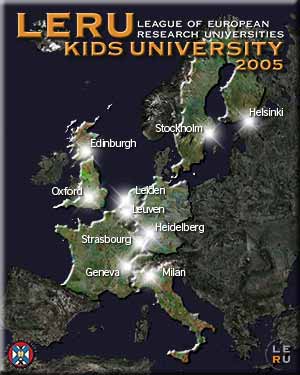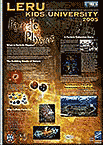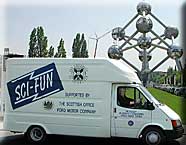 |
|
At the end of October and the beginning of November 2005, ten of the LERU universities held their own science week event as part of the LERU Kids' University; SCI-FUN ran the Edinburgh event from 7th - 13th November.
Click on the images below, or the menu links above, to find out more about the events in which SCI-FUN was involved, and to see the posters produced by the ten universities. For information on the LERU 2006 event, click here. |
|
From the LERU site, publicising the 2005 event: "The aim of the "LERU Kids' University" science week is to promote public understanding of research and science. The target group is made up of children aged 10 to 12 years and (indirectly) their parents. Fascination with science begins with curiosity, generating such questions as: "What makes robots clever?", "Why do we speak 'thin' air?" or "Why don’t the stars fall out of the sky?" Children at each of the ten participating universities in eight EU countries and Switzerland will experience exciting experiments and lectures on physics (in its broadest sense) during the Science Week. These will demonstrate the impact of science/physics on everyday life. The active presence of female scientists as key members of the project is designed to show that the natural sciences are, of course, equally accessible for women. In collaboration with media partners these messages will also be communicated to a broad public audience. "The European context of the LERU Kids' University will be presented in an exhibition. Each partner will be introduced in a poster, ensuring that the background of the science week becomes comprehensible. The exhibition will be accompanied by short films about the participating universities. The registration of thousands of children for the different events will be supported by a database. A final event including selected experiments and lectures will take place in Brussels one week after the specific LERU Kids' Universities have taken place. The message of the KidsUniversity will be: Universities are partners in lifelong learning, and that this can take place at a European or international level. Barriers to the understanding of the daily use of physics should be identified and overcome. The principal objective is to foster interest in science and physics on the part of children in Europe." |




